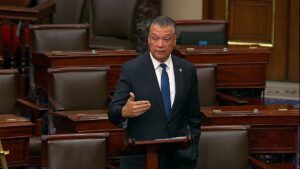
U.S. Representative Sylvia Garcia of Houston plans to re-introduce the American Dream and Promise Act, which offers a path to citizenship for Deferred Action for Childhood Arrivals (DACA) recipients. She announced this in Washington D.C. while speaking with the Congressional Hispanic Caucus (CHC). Members of the CHC focus on important issues affecting Hispanic communities, including immigration reform.
Don’t risk your case with unverified services. We’ll match you with a licensed immigration lawyer or accredited representative.
Find My Lawyer →Free case matching. No obligations. Only verified professionals.
Garcia wants President Donald Trump to stand by his claim that Dreamers should stay in the country. This comes after Trump signed orders to crack down on immigration, such as trying to end birthright citizenship and limiting protections for schools and churches. Meanwhile, a federal court ruled parts of the Biden Administration’s DACA rule unlawful. However, the court did allow current DACA recipients to renew their status in 49 states, but not in Texas.
Need help choosing an Immigration Lawyer?
We’ll connect you with a verified immigration lawyer who fits your case and location.
Start Free Case Review →The American Dream and Promise Act would grant conditional permanent resident status for 10 years to certain individuals brought to the U.S. as minors. Garcia says Republicans keep this issue alive for political reasons rather than seeking real solutions. Many people in Houston, around 31,000 DACA recipients, wait for a final answer. Garcia hopes to deliver this by pushing the bill forward once more.
Frequently Asked Questions About DACA and Immigration Reform
- What is the American Dream and Promise Act and what does it aim to do? The American Dream and Promise Act is a proposed law that would provide a pathway to citizenship for individuals who entered the United States as minors. It specifically targets those who are deportable or inadmissible, have deferred enforced departure or temporary protected status, or who are the children of certain non-immigrants. The act would initially grant a 10-year conditional permanent resident status, potentially leading to further options for permanent residency and citizenship.
- What is DACA and why is its future uncertain? Deferred Action for Childhood Arrivals (DACA) is an immigration policy that allows certain individuals who entered the U.S. as children, often referred to as “Dreamers,” to receive temporary protection from deportation and a work permit. DACA’s future is uncertain because of ongoing legal challenges. While current DACA recipients are still allowed to renew their status, new applications are largely on hold due to court rulings, and the long-term stability of the program is in question. A recent federal court ruling upheld a district judge’s decision that parts of the Biden administration’s DACA rule are unlawful, further jeopardizing the program.
- What is the Congressional Hispanic Caucus and what role do they play in immigration issues? The Congressional Hispanic Caucus (CHC) is an organization of Democratic leaders dedicated to advancing issues affecting Hispanics in the United States, Puerto Rico, and the Northern Mariana Islands through the legislative process. They play a significant role in advocating for immigration reform, particularly policies that support DACA recipients and provide pathways to citizenship. They have been vocal about pushing for legislative solutions like the American Dream and Promise Act.
- How has President Trump’s stance on DACA evolved, and what actions have been taken by his administration that impact immigration? President Trump has publicly stated he believes DACA recipients should be allowed to stay in the country. However, his administration has also pursued policies that are considered restrictive regarding immigration. These include executive orders aimed at ending birthright citizenship for children born to undocumented immigrants and stripping schools and churches of immigration enforcement protections. This mix of public statements and executive actions has created inconsistency and challenges to immigration policy.
- What legal challenges have impacted DACA recently and what is the status of the program now? A recent federal court ruling has deemed parts of the Biden Administration’s DACA rule unlawful. However, the rule has been allowed to take effect nationwide except for in Texas. This has resulted in DACA renewals being permitted in 49 states. The case is still under appeal, leaving the long-term status of DACA in question. New applicants are not able to apply to the program at this time.
- What is the perspective of U.S. Representative Sylvia Garcia on the issue of immigration reform? Representative Sylvia Garcia believes that comprehensive immigration reform is essential and is actively working to pass the American Dream and Promise Act. She criticizes the Republican Party for using immigration as a political issue without seeking genuine solutions and emphasizes the need for bipartisan cooperation. Garcia also plans to hold President Trump accountable to his stated support for Dreamers, and work with him to achieve a legislative solution.
- What is the significance of the location of Houston in the context of DACA recipients? Houston is home to a large population of DACA recipients, with approximately 31,000 people holding DACA status. Due to ongoing litigation and uncertainty regarding the program, this number has been declining. This makes Houston a significant location for DACA-related issues and its immigrant community is deeply impacted by decisions made at a federal level.
- What is the broader political conflict around immigration and how does this hinder progress on resolving the DACA issue? Immigration reform is a highly politicized issue, with different perspectives among both Republican and Democratic politicians. This political divide often leads to gridlock, making it difficult to pass comprehensive immigration legislation. The conflict stems from differing views on border security, pathways to citizenship, and the economic and social impact of immigration. One side is seen as exploiting these issues for political gain by opposing any lasting solutions, which continues to cause uncertainty for DACA recipients and those impacted by immigration policies.
Find a Verified Immigration Lawyer Near You
Avoid scams. Get help from licensed professionals who understand your case.
Get Matched Now →Free case evaluation. We are not a law firm — we connect you with trusted, verified lawyers.
